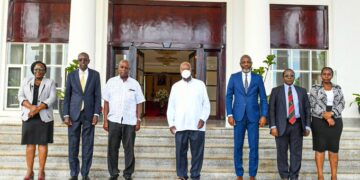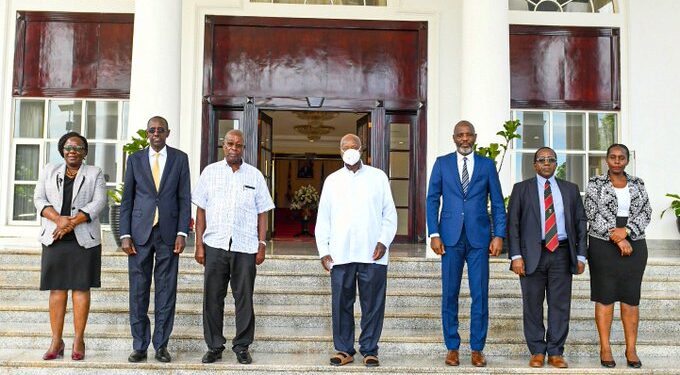President Yoweri Kaguta Museveni today met with the Education Policy Review Commission, led by Col (Rtd) Nuwe Amanya Mushega, at State House, Entebbe, to discuss proposed reforms aimed at transforming Uganda’s education system into a competence-based, socially responsive model.
Welcoming the Commission’s insights, President Museveni reaffirmed the urgent need for an education system that equips learners with practical life skills.
“By age 16, every Ugandan child should be useful,” he emphasised. “They should be skilled and have values that enable them to contribute to society. Whether they pursue music, academics, or agriculture, we must ensure they are not abandoned by the system.”
The Commission presented a comprehensive briefing, outlining key challenges and strategic recommendations. Central to their proposal was the call for a national education philosophy to guide curriculum design and implementation from early childhood through university.
“Your Excellency, our current curriculum is fragmented,” noted Dr Joseph Muvawala, Vice Chairperson of the Commission. “It is competence-based only in lower secondary, but knowledge-based in primary and upper secondary. University education remains largely theoretical.”
A major concern raised was the inconsistency in school feeding programs, particularly in government schools.
“Many children simply drink water or go without food during lunch, yet some schools still collect money. Those who pay, eat; those who don’t, eat air,” observed Hon. John Mwoono Nasasira.
Currently, Uganda’s education sector accounts for only 2.4% of GDP. The Commission recommended increasing this to 7% to enable comprehensive reforms, from curriculum updates to addressing disparities such as the salary gap between science and arts teachers, which is causing administrative and morale challenges in schools.
Other key proposals include: extending universal basic education, blending academic and vocational training, up to age 16, strengthening regulation and enforcement of education standards across public and private institutions and establishing a National Competence Profile focusing on civic values, discipline, environmental stewardship, teamwork, and patriotism.
The meeting marked a significant step towards building consensus on the future of Uganda’s education, with President Museveni affirming government’s commitment to reviewing and implementing reforms that promote equity, relevance, and life-readiness for all learners.









